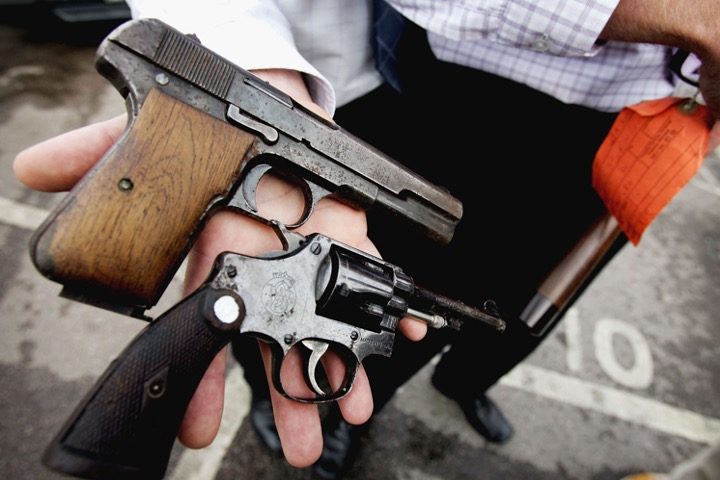
Twenty-six state attorneys general filed three separate lawsuits against the ATF (Bureau of Alcohol, Tobacco, Firearms and Explosives) on Wednesday, challenging its expanded definition of who is a gun dealer. If allowed to stand, that definition would force every private gun owner, over time, to become a gun dealer, falling under the rogue agency’s diktats and becoming part of a de facto national gun registry.
The suits were filed by Kansas (on behalf of 21 states: Alabama, Alaska, Arkansas, Georgia, Idaho, Indiana, Iowa, Kansas, Kentucky, Missouri, Montana, Nebraska, New Hampshire, North Dakota, Oklahoma, South Carolina, South Dakota, Tennessee, Virginia, West Virginia, and Wyoming) and Texas (along with Louisiana, Mississippi, and Utah), and by Florida individually.
The plaintiffs in the lawsuit filed in Texas on Wednesday noted the ATF’s definition of a dealer up until 2022:
For several decades … “engaged in the business” meant “a person who devotes time, attention, and labor to dealing in firearms as a regular course of trade or business with the principal objective of livelihood and profit though the repetitive purchase and resale of firearms, but such term shall not include a person who makes occasional sales, exchanges, or purchases of firearms for the enhancement of a personal collection or for a hobby or who sells all or part of his personal collection of firearms.” [Emphasis in the lawsuit.]
But, in 2022, following a directive from Joe Biden, the Department of Justice ordered the ATF to expand that definition in order to hew to the Biden administration’s determination to “plug” the “gun show loophole” — that freedom exercised by individuals to offer for sale a firearm at a gun show that, under some state laws, doesn’t require a background check. It was a blatant attempt by the administration to accomplish a political goal that it couldn’t achieve legislatively.
From the lawsuit:
The Final Rule’s new definition is: “Any person engaged in the business of selling firearms at wholesale or retail; any person engaged in the business of repairing firearms or of making or fitting special barrels, stocks, or trigger mechanisms to firearms; or any person who is a pawnbroker.
“The term shall include any person who engages in such business or occupation on a part-time basis. The term shall include such activities wherever, or through whatever medium they are conducted such as at a gun show or event, flea market, auction house, or gun range or club; at one’s home; by mail order; over the Internet (e.g., online broker or auction); through the use of other electronic means (e.g., text messaging service, social media raffle, or website); or at any other domestic or international public or private marketplace or premises.” [Emphasis in the lawsuit.]
If allowed to stand, that would mean that every private gun owner would violate the law, and be subject to severe sanctions by the ATF, if he or she attempted to sell a single firearm to another individual privately. The only “out” would be to become licensed by the ATF, which not only would subject that individual to the rules and regulations that currently apply to legitimate gun dealers, but also would permit the violation of their Fourth Amendment rights to be secure in their private possessions from raids by the ATF, which conducts such raids on gun dealers without a search warrant.
Worse, and this is no doubt intended, the ATF would then know the location of every firearm and its owner in the country — a de facto national registry of all firearms. This has been, and remains, the goal of every would-be dictator, who must disarm his subjects before subduing them.
Adolf Hitler put it best: “The most foolish mistake we could possibly make would be to permit the conquered Eastern peoples to have arms. History teaches that all conquerors who have allowed their subject races to carry arms have prepared their own downfall by doing so.”
Back in December, when it became clear to him that the ATF was going ahead with the new expanded definition despite nearly 400,000 public complaints against it, Dudley Brown of the National Association for Gun Rights said:
The ATF and Biden are playing definition games with U.S. Code as a means to ban the private transfer of firearms. The language of this proposed rule gives the government near universal authority to prosecute anyone who transfers a firearm.
Universal Gun Registration is the not so hidden agenda of the anti-gun crowd in D.C., and they don’t care how they get it.
Registration always leads to confiscation.
And confiscation leads to enslavement.
Here is a brief summary of the charges lodged against the ATF by the three lawsuits:
- The final rule exceeds the ATF’s authority
- The final rule is arbitrary, capricious, and an abuse of discretion, and not in accordance with the law
- The final rule violates the Fifth Amendment’s due-process protections
- The final rule violates the Second Amendment
- The final rule violates the Fourth Amendment right to be secure against unreasonable searches and seizures
- The final rule violates the Constitution’s “separation of powers” doctrine
The summary from the lawsuit filed by the State of Florida against the ATF put its complaint against the rogue agency succinctly:
The challenged rule is unlawful.
In the first instance, ATF does not have authority to promulgate it because ATF’s rulemaking authority is carefully circumscribed.
But even if it did, the challenged rule improperly attempts to depart from the plain meaning of the BSCA [the “Bipartisan Safer Communities Act,” passed in 2022 with the help of RINOs Mitch McConnell (Ky.) and John Cornyn (Texas)] to achieve President Biden’s policy goals.
Related article:
ATF Wants Every American Gun Owner to Be Licensed as a Dealer



